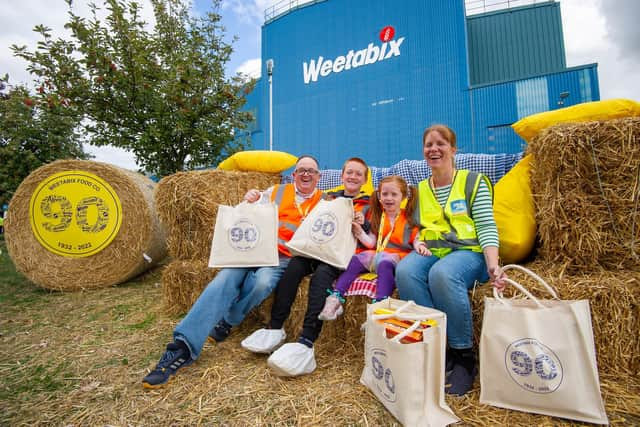Burton Latimer cereal giant Weetabix marks 90th anniversary
and live on Freeview channel 276
Staff at Burton Latimer’s iconic breakfast brand Weetabix have been celebrating the cereal giant’s 90th anniversary of fuelling the nation.
Founded in 1932 in Station Road, the Weetabix Food Company still operates from its original Northants base - alongside sites in Corby and Ashton-under-Lyne.
Advertisement
Hide AdAdvertisement
Hide AdRenowned for making some of Britain’s favourite breakfast cereals such as Weetabix, Alpen and Ready Brek, they also produce breakfast drink Weetabix On the Go.


To mark its nine decades celebrations are being held to thank its employees for their hard work and dedication.
Sally Abbott, managing director, Weetabix Food Company, said: “Life has changed a great deal over the decades that we’ve been manufacturing here in the UK, but our brand and products have remained trusted by families in the UK and around the world.
"Despite the challenges businesses like ours are facing at the moment, our 90th anniversary gives us an opportunity to celebrate, reflect on our progress and to look towards a bright and prosperous future.
Advertisement
Hide AdAdvertisement
Hide Ad“I’m so very grateful to everyone who has worked for us or works for us today - from manufacturing teams through to technical teams and warehouse operators, sales and marketing teams, support staff, our pensioners and our apprentices alike - for their tremendous efforts and dedication during our long history. Weetabix wouldn’t be Weetabix without our 90 years of brilliant people.”


Across four weekends in September and October, Weetabix employees will be joined by their families on factory tours at its site in Burton Latimer, giving relatives unique insights behind the scenes at the iconic British food manufacturer.
Lynn Furnival, one of Weetabix’s longest serving employees said: “I started as a lab technician in 1979, so I’ve been part of the company for nearly half its life.
"I’ve always been proud to work here alongside some fantastic people and with great development opportunities available to me. There’s been plenty of change throughout my time, but it’s what has kept it exciting – and the company has always lived up to its reputation of being a great place to work and one that provides products that are nutritious as well as delicious.
Advertisement
Hide AdAdvertisement
Hide Ad"The future feels bright for Weetabix, and I’m so excited to see all the new innovations and projects come to life.”
In 1932, Bennison Osbourne and Malcolm MacFarlane, Weetabix’s founders, formed the British and African Cereal Co Ltd. Their first move was acquiring a disused flour mill in Burton Latimer to start production of a revolutionary new cereal - Weetabix. In 1936, the company became Weetabix Limited and Frank George joined the board as a director, sparking an association with the George family that would go on to span 70 years.
Wheat for Weetabix Original is grown by Weetabix’s Growers’ Group - a collective of British farmers all located within 50 miles of the Burton Latimer factory. Set up in 2010, the group has involved more than 350 local farmers, growing approximately 75,000 metric tonnes of wheat each year, across more than 4 million acres.
